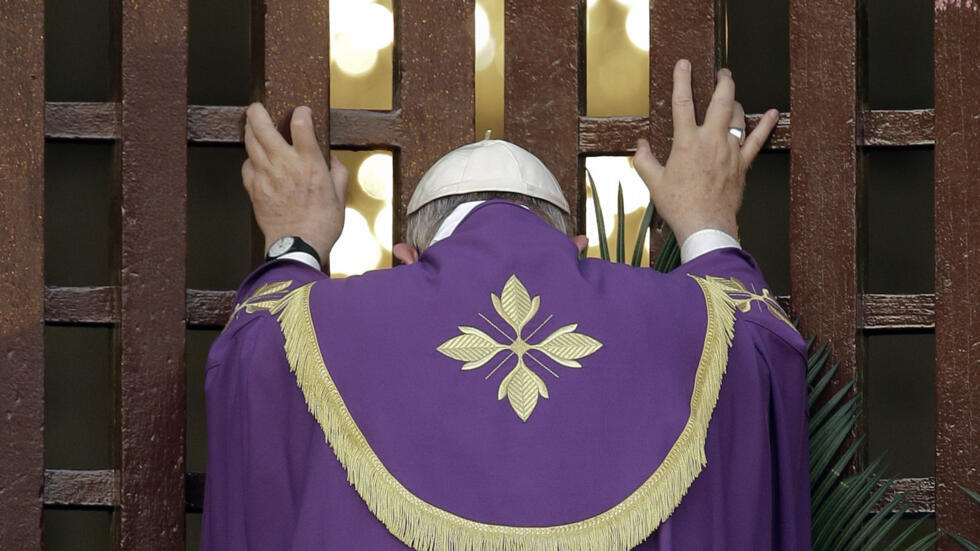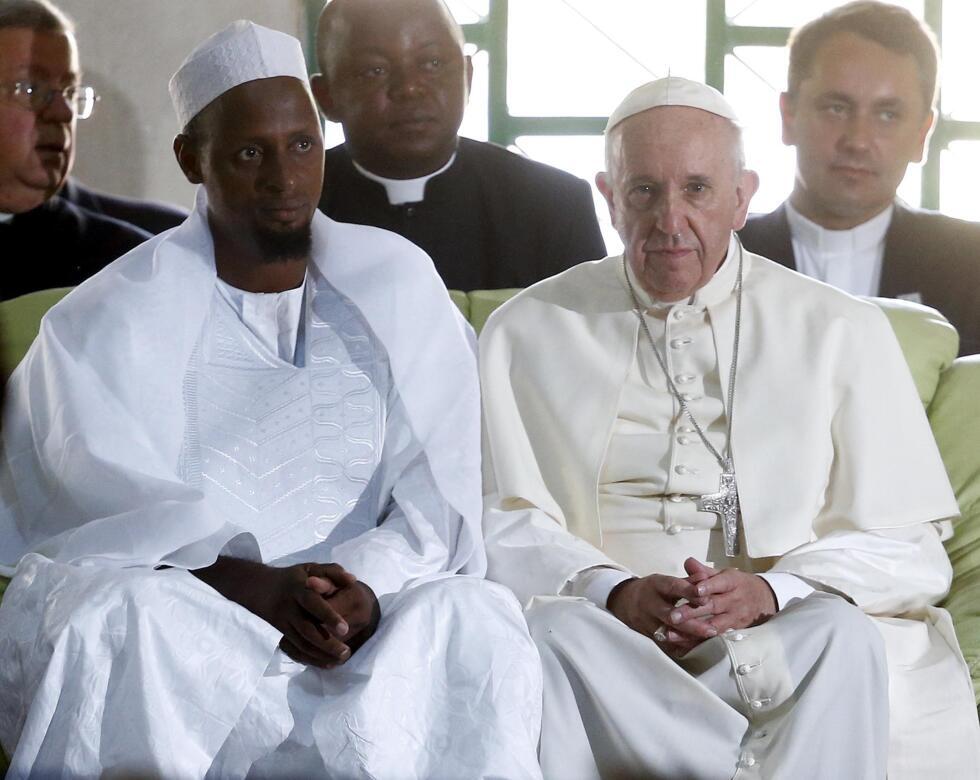
Pope Francis visited 10 African countries during his five trips to the continent, promoting inter-religious dialogue and tolerance while denouncing corruption and economic colonialism. Following the pontiff's death on Monday, African leaders have praised his "legacy of compassion" and "commitment to inclusivity" though there was disagreement over his stance on LGBTQ issues.
The chairman of the African Union Commission, Mahmoud Ali Youssouf, praised "the Pope's courageous engagement with the African continent, amplifying the voices of the voiceless, championing peace and reconciliation, and standing in solidarity with those affected by conflict and poverty".
An estimated 20 percent of the world's Catholics are on the African continent, the majority in Democratic Republic of Congo, Nigeria, Uganda, Tanzania and Kenya.
Kenya's President William Ruto said Francis "exemplified servant leadership through his humility, his unwavering commitment to inclusivity and justice, and his deep compassion for the poor and the vulnerable".
Fighting urban exclusion
During his maiden visit to the African continent in 2015, the pope celebrated mass in the church of Saint Joseph the Worker in the Kangemi slum in Nairobi, where he launched an attack on "new forms of colonialism" that exacerbate the "dreadful injustice of urban exclusion".
The pontiff criticised wealthy minorities who hoard resources at the expense of the poor and praised solidarity and mutual support in deprived neighbourhoods.
Lucy Nganga, a worshipper from Kangemi, remembers how Francis "presented himself as the pope of the poor and explained that that was why he had chosen this church".
Theresa Siuwai, another Catholic from the parish, told RFI she was marked by the fact he'd "chosen to come to the ghetto".
"We only see important people here when they're looking for votes. So for the pope to come to Kangemi, to see how we live and be part of our community, even for just an hour, it was an honour. We felt human."

'Reconciling two communities'
During that same 2015 visit to Africa, Pope Francis made a risky trip to Bangui, the capital of Central African Republic.
The country was still in crisis following a coup d’etat by the Seleka coalition against former president Francois Bozizé and there was ongoing tension between the fighting factions of the Muslim Seleka and the Christian anti-balaka.
Francis drove on the popemobile alongside both the highest ranking Muslim cleric in the country and his Christian counterpart, visiting a Christian church and a mosque.
France presses Pope to cancel Central African Republic visit
Fridolin, one of a group of young servers at the Bangui Cathedral, recalls the feeling of hope for peace and reconciliation that Francis inspired, heading into the Muslim quarter.
"When I close my eyes, I visualise everything," he told RFI. "At the height of the crisis, for two years, Christians could not set foot in PK5, a predominantly Muslim neighborhood, and no Muslim could leave PK5. But the pope braved this situation, he went all the way to the PK5 mosque," the young man recalled as he spread incense around the church. "That day, he drew thousands of Christians behind his procession to PK5. It was a great reconciliation. I saw, with my own eyes, the two communities embracing, crying, hugging each other."
Fridolin also recalls how the pope’s visit gave momentum to the rehabilitation of Bangui’s pediatric complex, which had fallen into ruins. At the time, many children were dying due to lack of care, but since 2015 childcare has been available for free.

Inter-religious dialogue
From his inauguration in 2013, Pope Francis underlined the importance of interfaith dialogue, receiving delegations from other churches and religions.
On 4 February, 2019, he signed the "Document on human fraternity for world peace and living together" with the Grand Imam of the Al-Azhar Mosque in Egypt, Ahmad Al-Tayeb.
The text specifies that Al-Azhar al-Sharif – the Islamic scientific body – and the Catholic Church "declare they adopt the culture of dialogue as a path; common collaboration as conduct; mutual knowledge as method and criterion".
Egyptian President Abdel Fattah al-Sisi said the pope's passing was "a profound loss for the entire world, as he was a voice of peace, love and compassion".
He "worked tirelessly to promote tolerance and build bridges of dialogue... and was a champion of the Palestinian cause, defending legitimate rights and calling for an end to conflict", Sisi said on Monday.
Pope tells clergy to speak out against injustice on South Sudan peace pilgrimage
Defender of migrants
Advocating for migrants, many of whom have made perilous journey across North African deserts or the Mediterranean to reach Europe, was one of Francis' priorities as pope. His first trip outside Rome in 2013 was to the Sicilian island of Lampedusa to meet with newly arrived migrants. He denounced the “globalisation of indifference” shown to would-be refugees.
The defence of migrants occupies a notable place in the 2020 encyclical Fratelli Tutti "on fraternity and social friendship", in which he condemned the behaviour of certain Catholics toward migrants.

"No one will ever openly deny that they are human beings, yet in practice, by our decisions and the way we treat them, we can show that we consider them less worthy, less important, less humann" he wrote. "For Christians, this way of thinking and acting is unacceptable, since it sets certain political preferences above deep convictions of our faith: the inalienable dignity of each human person regardless of origin, race or religion, and the supreme law of fraternal love."
Francis also roundly denounced the consequences of the West's policy of closing borders. In August 2024 he described efforts to repel migrants and block their routes as a "grave sin", as he recalled those who lost their lives, including those "abandoned" in the desert.
Earlier, in 2021 in Rome he referred to the Mediterranean Sea, the route most used by irregular migrants to cross into Europe, as the "largest cemetery in Europe".
Pope says repelling, abandoning migrants is 'grave sin'
Discomfort in African Archdioceses
Pope Francis's relationship with Africa has had its tense moments too. Early in his papacy, Francis signalled a more welcoming stance toward LGBTQ+ people, declaring "Who am I to judge?" when asked about a gay priest.
Through the Fiducia supplicans declaration, published in December 2023, he approved blessings for same-sex couples, providing they don’t resemble marriage vows.
It provoked outcry among African archdioceses and was immediately rejected by the bishops of several African countries.
Faced with the rebellion, Cardinal Fridolin Ambongo, president of the Symposium of Episcopal Conferences of Africa and Madagascar, went to the Vatican to present the viewpoint of African churches and work toward resolving the crisis.
They agreed on a message – approved by the pope – that religious leaders in Africa would not have to bless same-sex couples.
The episode is still talked about. "It was an uproar, especially in Africa," a Chadian Catholic told RFI. "The Vatican tried as best it could to provide arguments, but it never convinced anyone," the worshipper told RFI, adding that the tug of war was a defining moment of the pontificate.
Pope Francis says he supports civil union for homosexual couples
‘Hands off Africa!'
On other occasions, the head of the Catholic Church was in tune with the African continent.
In January 2023, shortly after landing in Kinshasa, DRC, he delivered a speech roundly condemning the exploitation of both the country and the continent more widely.
"Hands off the Democratic Republic of the Congo! Hands off Africa! Stop choking Africa, it is not a mine to be stripped or a terrain to be plundered," he said to rounds of applause, referring to rich resources such as diamonds and coltan that have brought conflict and death to the country.

Pope Francis repeatedly appealed for an end to the long-running conflict in eastern DRC.
DR Congo President Felix Tshisekedi paid tribute to a "great servant of God, whose life was a vibrant testimony of faith, humility, and unwavering commitment to peace, justice, and human dignity".
Pope tells Congolese to foster peace, denounces plundering of minerals
Throughout his pontificate, the pope underlined his attachment to the "inculturation" of faith which allows the Christian message to be integrated into specific cultures.
In 1988, the Zairean rite was approved for the DRC, then known as Zaire. It is, Pope Francis said, "the only inculturated rite of the Latin Church approved after the Second Vatican Council".
The specifically African adaptation of the Roman rite had a special place in Francis' teachings. He cited the "Roman Missal for the Dioceses of Zaire" several times as a "promising model for the Amazon and for other churches seeking an appropriate liturgical expression".
On 3 July, 2022, Francis celebrated a mass according to the Zairean rite at St. Peter's Basilica in Rome, concluding his homily in Lingala.
"Moto azalí na matói ma koyóka," Francis said. The crowd responded: "Ayóka" "Moto azalí na motéma mwa kondíma... Andima".
The words translate as "Let whoever has ears to hear, hear... Let whoever has a heart to consent, consent."







